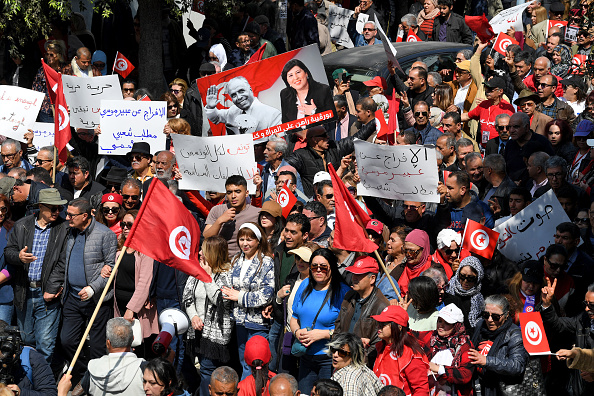Tunisians took to the streets on Wednesday to protest what they describe as the authoritarian rule of President Kais Saied, while six prominent opposition figures began a hunger strike in prison.
The rallies, which were held in the capital Tunis, reflect the growing frustration among opposition groups who accuse Saied of stifling dissent and consolidating power.
The protesters called for the immediate release of political prisoners, including opposition leaders, as they raised concerns about the president's control over the judiciary, media, and public discourse.
The demonstrations were organized by different opposition factions, including the Free Constitutional Party and the Salvation Front.
Members of the Free Constitutional Party rallied in central Tunis to demand the release of their leader, Abir Moussi, who has been detained by the authorities.
They carried banners and chanted slogans such as "Saied, dictator, your turn has come," and "Free Abir."
Hayat Ayari, one of the protesters, criticized the government's repression, saying, "What is happening is true tyranny, no freedom for the opposition, no freedom for the media. Any word can send you to prison."
Meanwhile, members of the Salvation Front gathered in a separate protest to demand the release of detained opposition figures, journalists, and activists.
At the heart of the ongoing political unrest is the growing number of imprisoned opposition leaders, including Moussi and Rached Ghannouchi, head of the Ennahda party, who were detained during a crackdown on political dissent in 2023.
Six prominent opposition figures, including Abdelhamid Jelassi, Jawhar Ben Mbarek, Khiyam Turki, Ridha Belhaj, Issam Chebbi, and Ghazi Chaouachi, have now joined a hunger strike in prison.
Their action is a protest against what they call an "unfair trial" and the charges of conspiracy against them.
The six have denied any wrongdoing, claiming they were merely working on a unification effort to bring together Tunisia's fragmented opposition.
President Saied has responded to the accusations by defending his actions, stating that he is not a dictator and that his crackdown on opposition forces is necessary to combat corruption within the political elite.
He has referred to the detained opposition figures as "traitors and terrorists" and accused the judges who acquitted them of being accomplices.
Saied’s critics, however, argue that his measures have undermined the democratic principles that Tunisia fought to establish after the 2011 revolution.
